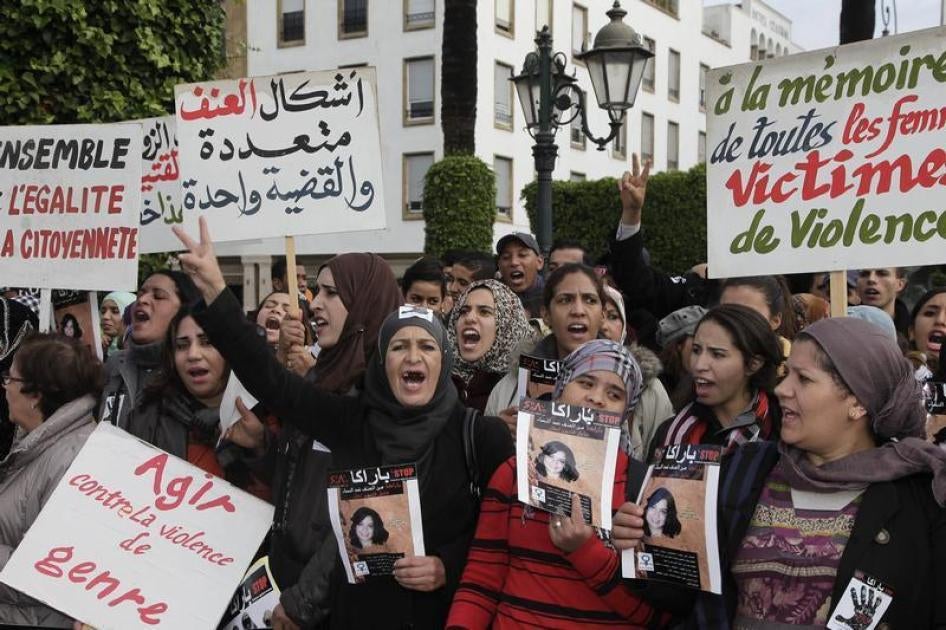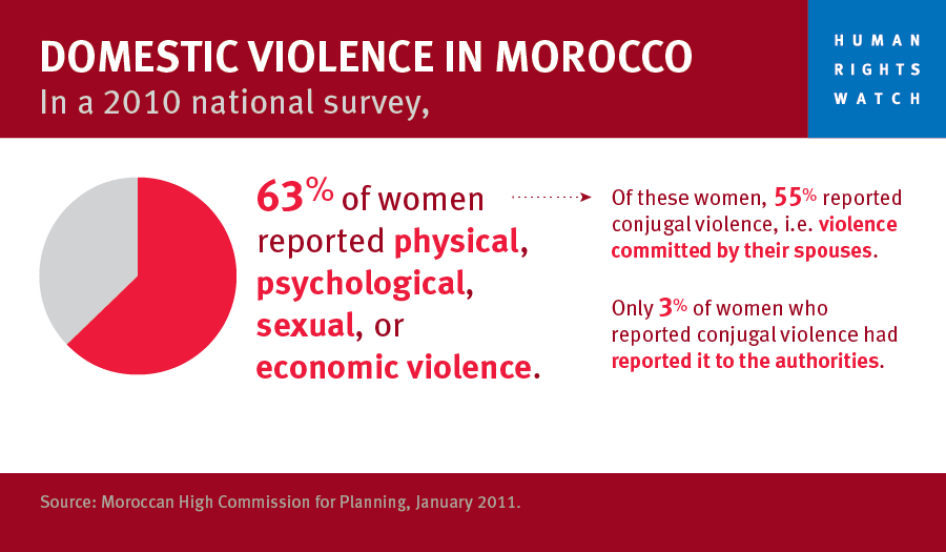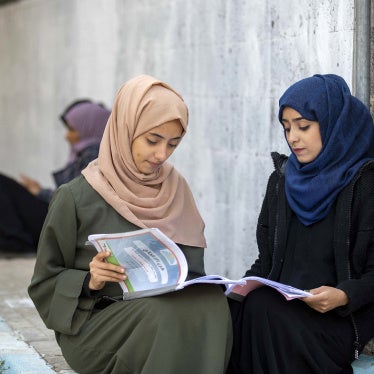(Beirut) – Moroccan police, prosecutors, judges, and other authorities often fail to prevent domestic abuse, punish the abusers, or assist survivors, Human Rights Watch said today in a letter to the Moroccan government. In part, that is because Moroccan laws don’t provide officials with guidance on responding effectively.
Morocco has taken steps toward legal reform on domestic violence, and three bills are pending. A bill on violence against women, which includes provisions on domestic violence, was developed by the Ministry of Solidarity, Women, Family and Social Development and the Ministry of Justice and Liberties and sent to the council of government for review in 2013. An update of the bill is underway, but is not publicly available. The other bills would make adjustments related to violence against women in the penal and criminal procedure codes.
The revisions would clarify domestic violence crimes and rules of evidence pertaining to them. In its letter to the two ministries, Human Rights Watch noted both positive aspects of the bills as well as provisions that, if adopted, would set rights back.
Positive provisions in the main violence against women bill include protective measures, such as removing abusers from the home or barring contact with the victim. It also includes provisions to expand coordination of specialized units to serve the needs of women and children in government agencies, and committees to address women’s and children’s issues.
Human Rights Watch urged the Moroccan government to improve these pending bills, by including, for example, emergency and longer-term orders for protection – also known as restraining orders. The bills should include a specific definition of domestic violence, spell out the duties of police, prosecutors, judges, and other authorities in cases of domestic violence, and criminalize rape by a spouse. The government should provide or fund essential services – including shelters – for domestic violence victims.
Some proposed amendments to the penal code would make matters worse for women, including a change to the penal code which would extend the possibility for reduced sentences for murder and assault to any family member who catches a family member engaged in illicit sexual intercourse (such as adultery). The government should repeal such provisions.
The Moroccan government should also ensure meaningful participation by nongovernmental groups and domestic violence survivors in the reform process.
United Nations agencies and human rights expert bodies have repeatedly urged Morocco to enact domestic violence legislation. In 2013, the European Union agreed to provide financial support for such reforms, including through a €45 million grant for Morocco to implement the government’s Gender Equality Plan of 2012-16. However, the Moroccan authorities have yet to come through on all their objectives, including enacting legislation on violence against women.
Around the world, about 125 countries have laws on domestic violence. In the Middle East and North Africa, seven countries or autonomous regions have legislation or regulations on domestic violence: Algeria, Bahrain, Iraqi Kurdistan, Israel, Jordan, Lebanon, and Saudi Arabia.
“Morocco should take a stronger stand for women’s safety and rights,” Begum said. “There is no better way to start than with a strong domestic violence law.”
Please see below for statements from domestic violence survivors and for further information on needed law reforms.
Accounts From Domestic Violence Survivors
The following case studies from Human Rights Watch interviews illustrate the types of abuse the women experienced and the government’s response. Names of survivors have been changed to protect their privacy.
Jihan
Jihan (pseudonym), 18, told Human Rights Watch that she married a man more than 10 years her senior when she was 15 or 16, and lived with him in a village in El Jadida province. They had a son who was 2 years old at the time of the interview.
Jihan said her husband abused her from the outset of the marriage:
Starting from the first night of marriage [my husband] didn’t respect me. He brought his friends… He asked me to do things against religion like getting naked and dancing when his friends came. He would play music. I would refuse and he would beat me.
She said her husband raped her repeatedly. “He forced me [to have sex], even if I refused.” She said he beat her every few days, once banging her head on the kitchen sink and causing a gash that required stitches.
When she went to the local police station for help, she said “They [police] said to me, ‘It’s your husband. We can’t do anything. Go to court.’ Even when I had bruises.”
In April 2015, she said, he beat and choked her until she lost consciousness. “I woke up and found myself on the street in my pajamas,” she said. “I went to the police. They said, ‘We can do nothing for you.’ I told them he won’t let me back in the house. They called him but he said, ‘It’s the wrong number.’” She said the police did nothing else, so she went to her sister’s house. Her husband found her and took her back home.
Jihan said that in August, after many more beatings, she asked her husband for a divorce. He replied, “You want a divorce? You can have it this way.” Then he punched her in the eye and attempted to slash her face with a knife. She raised her arm in defense, and he slashed her arm instead. A Human Rights Watch researcher observed fresh stitches on her arm. Jihan said that she did not file a criminal case because, “I am afraid he will take revenge or kill me.”
Jihan was staying at a shelter run by a nongovernmental organization at the time of the interview, and felt she had nowhere else to turn. She said she wanted a divorce, but her father refused to hand over her marriage certificate for the divorce application. She said he told her, “In our family, no women get divorced. Stay with him even if he wants to kill you.”
Fatima
Fatima (pseudonym), 34, from Fez, married when she was 17 and had two children with her husband. She said her husband started abusing her after six years of marriage, insulting her every day and beating her about once a month. She said he threw things at her, like books, a phone, and a glass. He spat in her food, and punched her so hard she lost a tooth. She said he burned her arm with a barbeque skewer and her leg with a cigarette. He also raped her frequently, she said. “He forced me to have sex with him and do it the way he likes. He forced me to have anal sex.”
Fatima said she went twice to the police in Fez. The first time was in 2006, after her husband burned her with barbeque skewer:
The police called him and he told them, “Look at this woman. I saved her from prostitution. She said I burned her when she burned herself.” He [the policeman] was looking at me and said, “Shame on you.” I said to him, “Is there a woman who can burn herself?” They asked me if there were eyewitnesses. I said, “No, it was done inside the house. Only my child was at home.” They said to me, “If you have eye-witnesses we can help you, if not, we cannot.”
In 2007, she said her husband threw a glass filled with acid on her, but she managed to shield herself and it landed on her coat and her son’s school bag instead of her skin. “For 15 days after that,” she said, “he locked me in the house, so I didn’t go to the police. I continued to stay with him after that because I was afraid of him.”
In 2010, Fatima said, her husband got drunk and demanded that she take off her clothes in front of their 9-year-old son. She refused, and he tried to stab her. She ran, and her neighbor paid for a taxi to the police.
She said the police seemed afraid to confront her husband, and advised her to go to her family. She said she filed a complaint with the prosecutor in Fez, but went back to her husband a week later under pressure from her brother-in-law. She said neither the police nor the prosecutor followed up with her.
Fatima left her husband in June 2015 and, at the time of the interview, was applying for a divorce while staying in a private shelter. Her 14-year-old son was living with her family and her 4-year-old son was still with her husband. She wanted to have her children with her.
Elham
Elham (pseudonym), a 26-year-old Amazigh (Berber) woman, married in 2011 and lived with her husband in Casablanca. They had twins, a boy and girl, who were 3 years old at the time of the interview.
Elham said her husband started abusing her four months into the marriage. “He would beat me violently,” she said. “He would cover my nose and mouth until I lost consciousness. He did this to shut me up when I cried or shouted so people could hear me. He wanted to kill me.” Starting when the twins were 4 months old, he would from time to time take the children and kick her out of the house, she said. She would intermittently take work as a domestic worker to have somewhere to stay.
She said she went often to the police at the Ain Sebaâ station to get help:
I went to the police many times. Even covered with blood or almost naked. They would do nothing for me. They would tell me that they don’t have the right to go with me into the house. They would tell me to go to the doctor to get a medical certificate but I had no ID and no money with me.
Elham left her husband in August 2015 after he attacked her again. “He was beating me until the neighbors came and helped. If the neighbors hadn’t come, I would be dead now.”
At the time of the interview, Elham was staying at a private shelter with her children and wanted to apply for a divorce. But her husband had her identification documents, and she had no money to pay a lawyer or court fees. She said: “I haven’t gone to police since I got here because the police will do nothing. If I go to the prosecutor he will say I have no ID.”
Khadija
Khadija (pseudonym), 23, married in 2011 and lived with her husband in Oujda. At the time of the interview, she had a 7-month-old son and was pregnant.
She said her husband beat her from the start of their marriage and during and after her pregnancy. He hit her on the head with the back of a knife, punched her face, and threatened to cut her face. “He knows I have nowhere else to go,” she said. “I had bruises all over my body.”
Khadija said that she went to the Oujda police many times, but they told her to go to the court and did not investigate. One time, she said, “I went at night with my nose bleeding and they said, ‘Leave, we can do nothing for you. Go tomorrow to the courthouse.’” On that occasion and others, she went to the prosecutor (in the courthouse), but the prosecutor did not file charges and sent her back to the police with a document directing the police to investigate. Each time she arrived at the police station with the document from the prosecutor, the police called her husband and told him to come to the police station, but he did not come. The police did not investigate further.
The police arrested her husband only once, in 2014, after he broke her nose while she was pregnant. A doctor issued a medical certificate indicating that she needed 21 days of rest for her injuries. Khadija showed the medical certificate to the prosecutor, who gave her an order to present to the police. She did, and the police arrested her husband. But before the case could proceed, Khadija dropped her complaint as she was seven months pregnant and worried what would happen to her if he was tried. The prosecutors did not pursue charges.
Khadija said her husband continued to beat her. She left him in August 2015 and went to a shelter. She wants a divorce, but fears she will have no choice but to return to him. She cannot stay in the shelter for more than two months, and has nowhere else to stay.
Safaa
Safaa (pseudonym), 27, had a “fatiha” marriage (traditional marriage) at age 15 that was not officially registered. She lived with her husband in a village between the cities of Settat and Khouribga. They have a son who was 3 years old at the time of the interview.
Safaa said that in 2014, her husband’s family told him to kick her out of the house as they wanted him to marry a relative. She said her husband and his two brothers proceeded to beat her and dragged her on the floor by her hair. Then her husband stabbed her in the side with a knife. “If my sister wasn’t there they would have killed me,” she said. They then kicked her out of the house.
She said she was hospitalized for two days and received a medical certificate. She reported the abuse and provided the certificate to a prosecutor in Casablanca.
The prosecutor gave her a document directing the police to investigate the case, and told her to deliver it. She took it to the Maarif police station in Casablanca, but said they told her they would only help if she gave them money. She went back to the prosecutor, who gave her another document for the police. But she said the police told her to “get lost.”
Shayma
Shayma (pseudonym), 38, lived in Salé with her husband and three children. She married him when she was in her late 20s. She said that two months into their marriage, he started having an affair, then started to beat her. She said he would punch her, throw her from the bed, and one time kicked her in her belly when she was pregnant. She said he raped her many times, and demanded money from her.
Shayma went to the police in Salé after her husband punched her and broke her teeth in May 2015. She got a medical certificate from a doctor at a hospital, and took it to the public prosecutor in Rabat. She also visited a unit to address violence against women in the court in Rabat.
The prosecutor gave her a document instructing the police to investigate, and told her to give it to them. She did, but said the police did nothing. She went back to the prosecutor, who provided another such document. She said the police told her, “We already called him twice, but your husband doesn’t want to come. We have done our job.”
She said her husband left the house after the police called him, but then started demanding that she leave the family house. She said she did not have the money to fix her broken teeth. Neither the police nor the prosecutor had followed up with her as of September 2015, she said.
Recommendations for Domestic Violence Law Reform
Human Rights Watch recommended that the Moroccan government strengthen the bill on violence against women, the penal code reforms, and the criminal procedure reforms in the following areas:
- Definition and Scope of Application of Domestic Violence Laws: The bills should clearly define “domestic violence,” and criminalize marital rape. In line with UN standards, it should include former spouses and individuals in non-marital intimate relationships, among other categories, as well as married cohabiting spouses.
- Prevention Measures: The bills should require prevention measures, including awareness-raising, educational curricula, and sensitizing the media on violence against women.
- Law Enforcement and Public Prosecution Responsibilities: The bills should specify police and prosecutor duties in domestic violence cases. They should make clear that the responsibility for deciding whether to prosecute violence against women lies with prosecution authorities, not with survivors. They should require police and public prosecutors to coordinate directly, rather than asking complainants to deliver messages back and forth.
- Justice System Responsibilities: The bills should clarify that a domestic violence complainant’s testimony may, in some circumstances, be sufficient evidence for a conviction, without other witnesses. They should explain that the severity of an injury should be a factor in sentencing, but doctors’ estimates of medical incapacitation should not be the only criterion considered in arrests, prosecutorial decisions, and criminal trials.
- Orders for Protection: The bills should specifically address emergency and longer-term protection orders – that is, restraining orders – for domestic violence survivors at risk of abuse, clarify the restrictions or conditions such orders can impose, and establish procedures for both types of orders.
- Other Services and Assistance for Survivors: The bills should provide for support and services to domestic violence survivors, including shelter, health services, psychosocial care, legal advice, and hotlines. The government should create a trust fund or other financial assistance for survivors of domestic violence.










